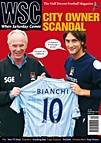 Did Giorgio Chinaglia try to make the president of Lazio an offer he couldn’t refuse? Matthew Barker reports on a playing legend being charged with extortion
Did Giorgio Chinaglia try to make the president of Lazio an offer he couldn’t refuse? Matthew Barker reports on a playing legend being charged with extortion
Giorgio Chinaglia has never been a man to waste too much time worrying about what others might think of him. Certainly few in Italy are expecting the one-time Azzurri striker to turn up at a Rome courthouse on October 26 to answer accusations of extortion and trying to manipulate share prices.
The charges, brought by the Guardia di Finanza (the financial police, usually kept busy trying to enforce payment of income tax), refer to an attempted takeover of Lazio, one of Chinaglia’s former clubs, in the spring of 2006. A Hungarian pharmaceutical company was to put up the cash for a proposed buyout of club president Claudio Lotito, with Chinaglia in the role of spokesperson and, presumably, all set to inherit Lazio’s presidency should the bid prove successful (not for the first time, either; the Swansea-raised Italian actually bought the Roman club in the early 1980s, overseeing a dismal three-year period in which they were relegated and Chinaglia investigated for false accounting and bankruptcy).
Shares in the club duly leapt by 34 per cent as rumours began to circulate of the potential takeover bid. Lotito had no intention of selling, however. Having taken control from Sergio Cragnotti in 2004, following the collapse of the Cirio food group, he has been determined to change the club’s culture, most notably refusing to talk to members of Lazio’s hardcore ultrà following and stopping the long-held (and in Italy widely held) practice of allowing members of the Irriducibili group to sell tickets and merchandise, forcing the closure of their shops and cutting off their main source of revenue.
While the constant stream of “Calcio’s Mr Clean takes on the bully boys of Curva Nord” articles may start to grate after a while (and Lotito even went so far as to arrange the draping of his own “Grazie Claudio!” banners at home games), there’s no denying that a growing mood of optimism surrounds the club, with plans for a move to their own stadium and “leisure complex” well underway and a young, entertaining side back in the hunt for domestic honours under coach Delio Rossi (who was linked with a move to Juventus this summer).
Not everyone has greeted the new dawn quite so enthusiastically, of course. Four Irriducibili capi-ultrà (head ultras) have been charged with “intimidating acts”, including menacing phone calls and letters, warning Lotito to sell up to Chinaglia’s consortium. Police tapes include one of the four threatening to break the legs of Lotito’s wife, while Rossi was denounced as a “worm and a communist”. The fans have been detained since last October (three are already appealing against a prison sentence for roughing up a Gazzetta dello Sport journalist).
Meanwhile, Richter Gedeon Rt, the Hungarian company said to be tabling a bid, denied all knowledge or interest in buying a controlling stake in the club. Police have since claimed that any money for the bid was actually to be supplied by businessman Giuseppe Diana, who’s currently under investigation by authorities in Naples for money-laundering and links to Camorra criminal gangs. Chinaglia returned home to New York (where he co-hosts a football phone-in show on satellite radio) before the police could question him.
The former Cosmos player denies any financial skullduggery, but is yet to distance himself from the arrested fans. “It’s incredible, I don’t know where the charge has come from,” he told Italian journalists. “I’ve never attempted extortion. Who knows what Lotito wants? I don’t. It’s all very sad. Lotito didn’t want to sit around the table with us and, if he doesn’t want to sell, fine, we’ll leave it.”
Now 60, Chinaglia remains an icon thanks to his role in Lazio’s notorious 1970s heyday and is still a huge hero to the club’s supporters, but he is an increasingly bitter figure, reduced to ranting in the margins and, despite appearances to the contrary, clearly very bothered about how others see him. A warrant for his arrest was issued by the Italian authorities last year and, along with the four Irriducibili, five members of the original “consortium” will stand trial, accused of insider trading.
Chinaglia, to all intents and purposes now living as a fugitive, has insisted he will return to Italy – one day. Another messy chapter in the life of one of the Italian game’s most controversial figures, then, but, equally, another step forward for one of its most controversial clubs.
From WSC 247 September 2007